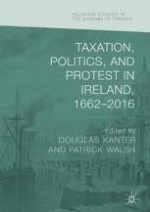2019 | OriginalPaper | Buchkapitel
6. That ‘Absurd Phantom Called Free Trade’: The Politics of Protection in Ireland, c. 1829–52
verfasst von : Andrew Shields
Erschienen in: Taxation, Politics, and Protest in Ireland, 1662–2016
Aktivieren Sie unsere intelligente Suche, um passende Fachinhalte oder Patente zu finden.
Wählen Sie Textabschnitte aus um mit Künstlicher Intelligenz passenden Patente zu finden. powered by
Markieren Sie Textabschnitte, um KI-gestützt weitere passende Inhalte zu finden. powered by
